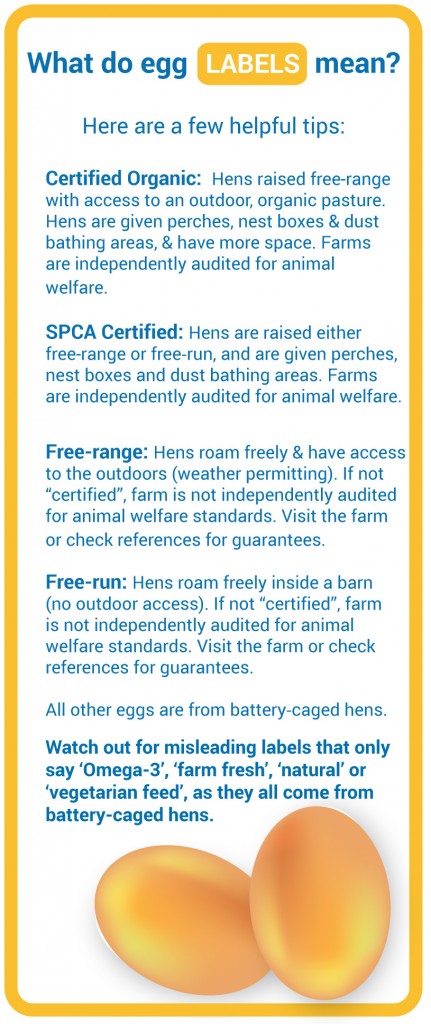Charity Spotlight: This post was provided by Debra Probert, Executive Director of the Vancouver Humane Society, as part of our ongoing charity spotlight series.
Have you ever wondered why some people don’t eat meat? The reasons are varied, but for the Vancouver Humane Society, a vegetarian lifestyle is important to protect animals from farming practices they view as cruel. The organization’s Executive Director provides insights on issues that have led her organization to promote the idea of a vegetarian lifestyle.
Old Macdonald Sold the Farm
What comes to mind when you think about farm animals? Bucolic rural images of hens foraging in the earth, pigs rooting in mud, and cattle wandering the range? You could be forgiven for thinking so, especially based on images you see in industry advertising and on commercial vehicles carrying meat products. The images of smiling pigs and free-range chickens are ubiquitous.
The truth is, Old Macdonald sold the farm more than 50 years ago to make way for intensive farming. For most of the 640 million animals slaughtered for food each year in Canada, the reality is decidedly different – their lives are miserable from life to death. Standards for their care exist, but they are recommended, therefore voluntary, and they are so minimal that they entrench practices like overcrowding, de-toeing, de-beaking, tail docking, and other painful procedures, many of which would result in cruelty charges if they were done to our pets. In law, these practices are referred to as “generally accepted management practices” and therefore are not subject to prosecution.
The most effective way to help animals is to stop eating them. That’s why the Vancouver Humane Society has moved philosophically towards a position of promoting vegetarianism as a way to stop animal suffering. Our Chicken OUT!, Eat Less Meat, Eat Less Chicken and upcoming Meatless Menus campaigns, along with our Food/Friend bus ad, aim to inform consumers about how their choices affect the lives and deaths of farm animals. The good news is that consumers have the power to have a profound effect on animal suffering!
Plucked From The Gutter – Hank’s Lucky Day
Hank was destined for a slaughter facility in East Vancouver when he fell from the transport truck into the gutter. A passerby could not ignore the eight-week-old bird who, although he appeared full-grown, cheeped like a baby. He scooped Hank up and took him home, eventually finding a place for him at a sanctuary in the Gulf Islands.
For the first few months, Hank thrived. He enjoyed being out in the sun, foraging for insects and dust-bathing – natural behaviours that are impossible in a crowded commercial barn of 5000 to 50,000 birds. His appetite, however, was insatiable – the result of breeding for fast growth; today’s meat chickens are ready for market in 38 – 40 days, compared to 84 days in the 1950s.
Even with restricted feed, Hank kept growing. As his weight continued to put a strain on his skeleton and his heart and other organs, moving became more painful as his bones weakened. One morning, Hank was found dead. He had succumbed to a heart attack – a premature death that befalls any rescued intensively-raised chicken within a year or two. The normal lifespan of a chicken of 15 – 20 years has been drastically altered in the endless quest for cheaper meat.
Getting hens out of cages
Hank was a Broiler hen (raised for meat), but egg-laying hens are also bred specifically for high production and live stressful, short lives. Chances are your morning egg came from the 95 percent of Canada’s hens kept in a battery cage – wire cages with 5-7 other hens – for their entire productive life of sixteen to eighteen months. A hen on a modern factory farm lays about 300 eggs per year – in 1956 that figure was around 170. Breeding has unintentionally created an extremely nervous bird – as a result, hens’ beaks are sliced off at the tip to keep the hens from harming each other in close quarters.
It doesn’t have to be this way!
Even a slight reduction in meat consumption and a change in egg-buying practices reduces animal suffering, but that’s not all. In June 2007, a UN study, “Industrial Livestock Production and Global Health Risks”, blamed intensive livestock farming for threats to the environment and human health.
Meat consumption has been linked to cancer, heart disease, diabetes, high blood pressure and obesity. It has also been cited in numerous studies as a significant contributor to climate change. With the multitude of meat substitutes available today, it’s easier than ever to move towards a plant-based diet.
There is no more effective way to lighten your footprint on the planet!
Vancouver Humane Society is dedicated to the humane treatment of animals. To find out more about their Chicken OUT!, Eat Less Meat, Eat Less Chicken campaigns, and learn more about the organization, visit their charity profile page >>>


Leave a Reply